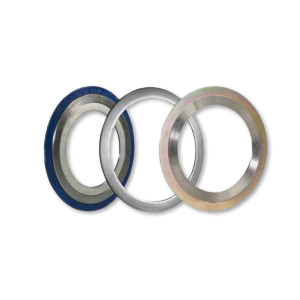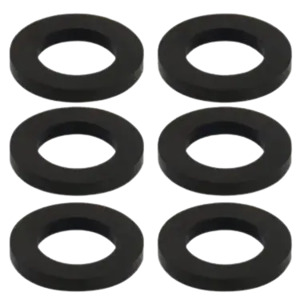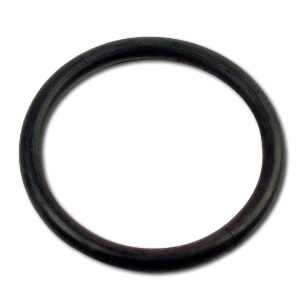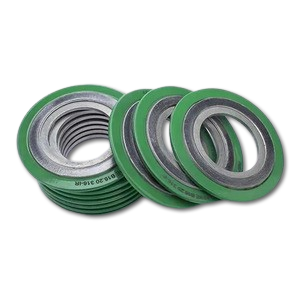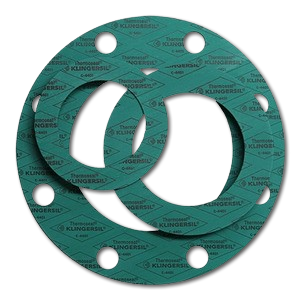METALLIC GASKETS
Specifications:
- Material:
- Metallic Gaskets are typically made from a variety of metals, including:
- Stainless Steel (SS 304, 316)
- Carbon Steel
- Inconel
- Monel
- Copper
- Aluminum
- Bronze
- Composite Materials: Some metallic gaskets may incorporate non-metallic materials such as graphite, PTFE, or elastomers for additional sealing performance.
- Metallic Gaskets are typically made from a variety of metals, including:
- Size Range:
- Available in sizes ranging from 1/2″ to 36″ or larger, with custom sizes made to order based on the specific application.
- Pressure Rating:
- Metallic gaskets are suitable for high-pressure applications, commonly rated for Class 150, Class 300, Class 600, Class 900, and even up to Class 2500 and 10,000 psi for extreme conditions.
- Temperature Range:
- The temperature resistance depends on the material used. Metallic gaskets typically operate within a temperature range of -200°C to +1000°C (depending on the metal, some alloys can withstand even higher temperatures).
- Types of Metallic Gaskets:
- Ring Type Joint (RTJ) Gaskets
- Spiral Wound Gaskets
- Kammprofile Gaskets
- Solid Metal Gaskets
- Camprofile Gaskets
- Metal Jacketed Gaskets
- Surface Finish:
- Smooth or Raised Surface finishes depending on the application requirements.
- Compliance:
- Manufactured in accordance with various international standards such as ASME B16.20, ASME B16.5, API 6A, ISO 9001, and DIN standards to ensure compatibility and performance.
Classification:
- Type: Metallic Gaskets
- Application: Used in applications where high temperature and high-pressure resistance is required, such as in pipelines, pressure vessels, heat exchangers, and flanged connections. Common in industries like oil & gas, chemical processing, petrochemical, power generation, and marine applications.
- Materials: Carbon Steel, Stainless Steel (SS304, SS316), Inconel, Monel, Copper, etc.
- Pressure Rating: Typically rated for Class 150, Class 300, Class 600, Class 900, Class 2500, or even higher for extreme pressure applications.
- Temperature Range: Ranges from -200°C to +1000°C, depending on the specific material and type of gasket.
Description:
Metallic Gaskets are engineered for high-pressure, high-temperature applications where traditional soft gaskets (like rubber or elastomeric) might fail. These gaskets are designed to provide a reliable, leak-proof seal between mating flanges and other pipe fittings under demanding conditions.
Types of Metallic Gaskets:
- Ring Type Joint (RTJ) Gaskets: These gaskets are typically used in high-pressure and high-temperature environments, such as oil and gas pipeline systems. The gasket is made from metal and shaped in a ring form that fits into a groove in the flange. It provides excellent sealing under high pressure.
- Spiral Wound Gaskets: These consist of a combination of metal and filler material wound in a spiral pattern. They offer flexibility and compressibility while maintaining a reliable seal. These gaskets are widely used in heat exchangers and pressure vessels.
- Kammprofile Gaskets: A metal core gasket with an elastomeric sealing layer or metal sealing facing, providing a tight seal in high-pressure applications. The Kammprofile gasket offers high mechanical strength and excellent sealing properties.
- Solid Metal Gaskets: These are made from a single piece of metal, usually stainless steel, and are used in applications where extremely high temperatures and pressures are encountered.
- Metal Jacketed Gaskets: A combination of metal and non-metallic materials (like graphite or asbestos), where the metal provides structural strength and the non-metallic material acts as the sealing material.
Applications:
- Oil & Gas: Used in pipelines, pressure vessels, and flanged connections in both offshore and onshore systems.
- Chemical Processing: Metal gaskets are used in reactors, distillation columns, and piping where high temperatures or pressures are involved.
- Power Generation: Found in steam and gas turbines, heat exchangers, and boilers where they seal critical components.
- Marine & Aerospace: Used in exhaust systems, engines, and turbines where high-temperature resistance is crucial.
- Food & Beverage Industry: Metal gaskets are sometimes used in high-temperature food processing equipment.
Advantages:
- High Pressure and Temperature Resistance: Metallic gaskets are designed to handle extreme conditions that would damage other types of gaskets.
- Durability: Long-lasting, even under aggressive operating conditions such as high pressures, temperatures, and chemical exposures.
- Leak-Proof: Provides excellent sealing even in critical applications, preventing hazardous leaks in pressurized systems.
- Versatile: Can be used in a wide range of industrial applications, including gas, steam, and chemical handling systems.
